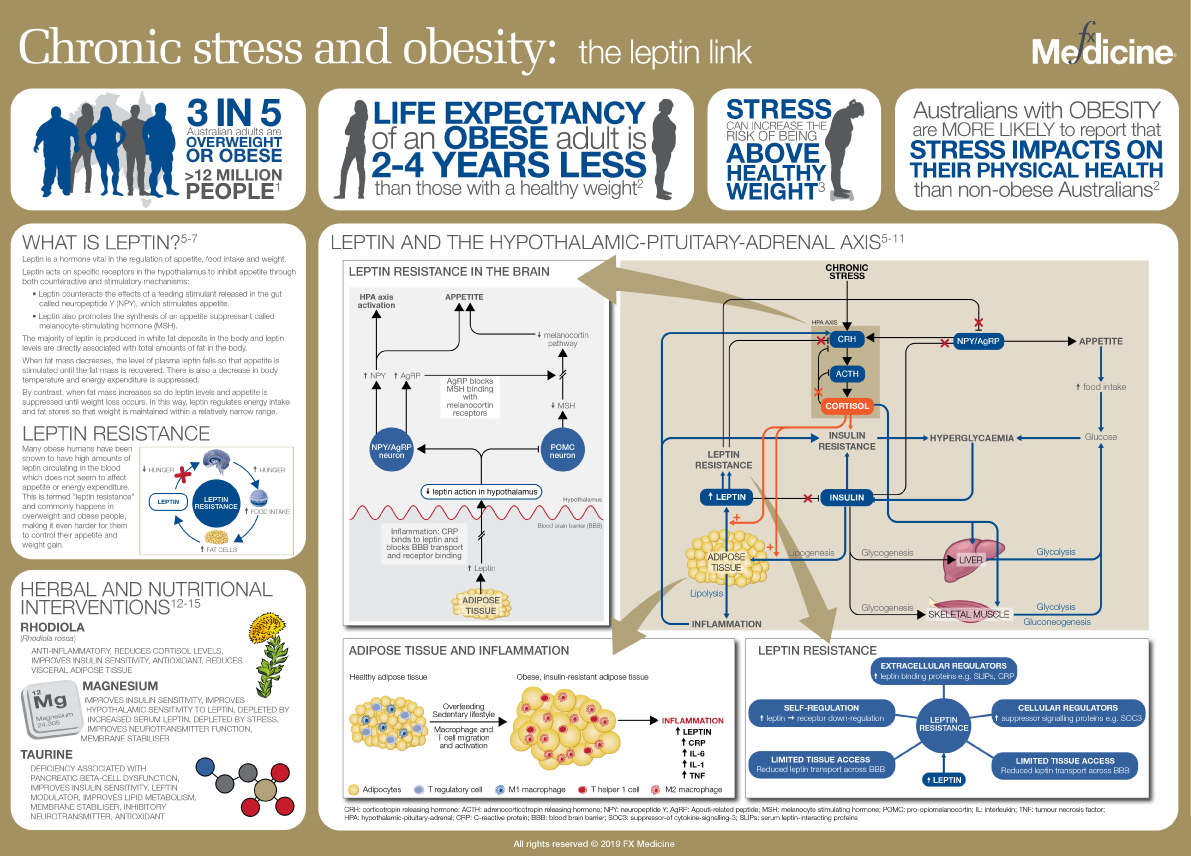
It is easy to presume that adipocytes are just storage units for excess calories in the form of fat. In fact our fat cells are sophisticated endocrine organs responsible for regulating our metabolism and energy homeostasis. One of the key hormones produced by adipocytes is leptin. This polypeptide binds to leptin receptors in the hypothalamus to decrease appetite and increase metabolic rate. Leptin is your body’s way of letting you know you have eaten enough and to stop producing insulin. In the case of obesity, leptin production increases as adipocytes fill with triglyceride. However, rather than further reducing appetite, leptin receptors eventually become desensitised and become leptin resistant. The consequence of this common scenario is a propensity to overeat with a corresponding slowing of metabolism.
Leptin may also provide negative feedback inhibition to the hypothalamic-pituitary-adrenal (HPA) axis, which is crucial for adapting to chronic stress. Consequently, leptin resistance influences the stress response and increases cortisol production. Cortisol acts directly on adipose tissue, increasing leptin synthesis and further contributing to leptin resistance. Therefore, a therapeutic approach that addresses HPA axis dysregulation and the stress response is a critical component to effectively managing leptin resistance, obesity and metabolic syndrome.
Various studies have demonstrated the beneficial effect of Rhodioloa rosea on the stress response, anxiety and cortisol levels. As a true adaptogen, rhodiola has also been shown to inhibit stress-activated inflammatory protein kinases, nitric oxide, leukotriene B4 and C-reactive protein (CRP). Under inflammatory conditions CRP binds to leptin preventing it from crossing the blood-brain barrier to reach receptors in the hypothalamus. High leptin levels with corresponding leptin resistance is commonly associated with low magnesium.
As an essential cofactor for normal glucose metabolism and insulin function, magnesium is the foundational nutrient for metabolic management. Numerous studies have also shown that magnesium lowers inflammatory signals CRP, tumour necrosis factor (TNF)-alpha and interleukin (IL)-6 which may also result in improved leptin receptor sensitivity.
The amino acid taurine has also been shown to reduce leptin resistance by decreasing endoplasmic reticulum stress, serum lipids, glucose levels and insulin resistance.
In this infographic we take a close look at the role of leptin, its relationship with cortisol and insulin and the nutritional influences that have been shown to improve its function.
RESEARCH
- Overweight and obesity. Australian Institute of Health and Wellbeing 2015. Viewed 5 March 2015, http://www.aihw.gov.au/overweight-and-obesity/
- Obesity: prevalence trends in Australia. Australian National Preventive Health Agency 2014, Viewed 5 March 2015. http://sydney.edu.au/medicine/public-health/menzies-health-policy/public...
- Mouchacca J, Abbott GR, Ball K. Associations between psychological stress, eating, physical activity, sedentary behaviours and body weight among women: a longitudinal study. BMC Public Health 2013;13:828. [Full text]
- Stress and wellbeing in Australia survey 2014: Key findings. Australian Psychological Society. Viewed 5 March 2015, http://http://www.psychology.org.au/Assets/Files/2014-NPW-Key-findings-s...
- Perry RJ, Zhang XM, Zhang D, et al. Leptin reverses diabetes by suppression of the hypothalamic-pituitary-adrenal axis. Nature Medicine 2014;20(7):759-763. [Full text]
- Roubos EW, Dahmen M, Kozicz T, et al. Leptin and the hypothalamo-pituitary-adrenal stress axis. General and Comparative Endocrinololgy 2012;17(1):28-36. [Abstract]
- Yokaichiya DK, Galembeck E, Torres BB, et al. Insulin and leptin relations in obesity: a multimedia approach. Advances in Physiology Education 2008;32(3):231-236. [Full text]
- Brydon L. Adiposity, leptin and stress reactivity in humans. Biol Psychol 2011;86(2):114-120. [Full text]
- Liao SC, Lee MB, Lee YJ, et al. The counterbalance between leptin and cortisol may be associated with comorbid depression and anxiety. Psychiatry and Clinical Neurosciences 2006;60:120. [Full text]
- Ouchi N, Parker JL, Lugus JJ, et al. Adipokines in inflammation and metabolic disease. Nature Reviews Immunology 2011;11:85-97. [Full text]
- Martin SS, Qasim A, Reilly MP. Leptin resistance: A possible interface of inflammation and metabolism in obesity-related cardiovascular disease. J Am Coll Cardiol 2008;52(15):1201-1210. [Full text]
- Takaya J, Yamato Y, Kuroyanagi Y, et al. Intracellular magnesium of obese and type 2 diabetes mellitus children. Diabetes Ther 2010;1(1):25-31. [Full text]
- Verpeut JL, Walters AL, Bello NT. Citrus aurantium and Rhodiola rosea in combination reduce visceral white adipose tissue and increase hypothalamic norepinephrine in a rat model of diet-induced obesity. Nutr Res 2013;33(6):503-512. [Full text]
- Kim KS, Oh da H, Kim JY, et.al. Taurine ameliorates hyperglycemia and dyslipidemia by reducing insulin resistance and leptin level in Otsuka Long-Evans Tokushima fatty (OLETF) rats with long-term diabetes. Exp Mol Med. 2012;44(11):665-673. [Full text]
- Braun L, Cohen M, Herbs and natural supplements: an evidence-based guide, Vol 2, 4th ed. Sydney: Churchill Livingstone Elsevier, 2015.
This image by FX Medicine is licensed under a Creative Commons Attribution-NonCommercial-NoDerivatives 4.0 International License.
More information about how to share/use the infographics for personal use.
If you interested in using any FX Medicine content for commercial use please contact us.
DISCLAIMER:
The information provided on FX Medicine is for educational and informational purposes only. The information provided on this site is not, nor is it intended to be, a substitute for professional advice or care. Please seek the advice of a qualified health care professional in the event something you have read here raises questions or concerns regarding your health.




